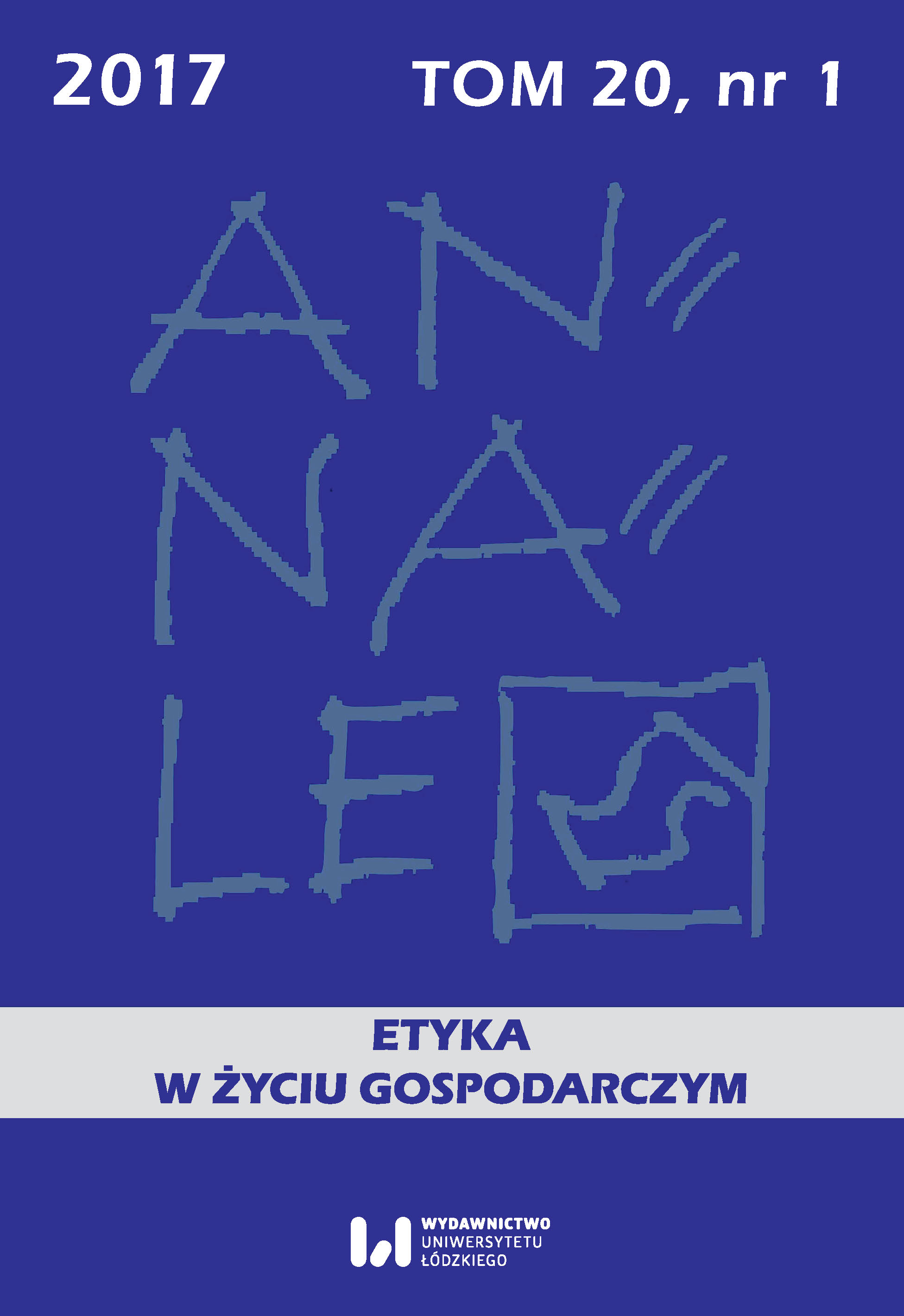Honesty and Openness as Values of a Contemporary Academic Teacher
DOI:
https://doi.org/10.18778/1899-2226.20.1.04Keywords:
honesty, openness, public higher education institution, academic teacherAbstract
The changes that contemporary organisations go through result in a shift in management conduct, organisation and management of human resources. Such trends are observable in public higher education institutions in Poland. Organisations striving to actively compete in a dynamic environment, and answer its needs, introduce amendments in various areas of their operations. Endeavours to improve the quality of teaching and ensure more efficient and effective management of higher education institutions are becoming ubiquitous. Changes are not only “cosmetic” in nature, but regularly interfere with organizational culture – and, as such, are challenging and implemented over a long time frame. Organisational culture, with values at its core, is a resultant of many factors, including values brought in by an organisation’s employees. For higher education institutions, this aspect is an important starting point for further reflections. The ethos of academics, through historical determinants, is based on honesty and openness – some key values that form the basis for decision making in diverse areas of operations. This article focuses on honesty and openness as desirable social values and components of a wider social capital – trust, with the benefits of professing trust taken into account as well. At the same time, an attempt has been made to show the role of those values in the context of the work of public higher education institution employees. Theoretical considerations are backed by illustrative quantitative empirical research. Research has been conducted among employees in the positions of researchers, educators and researcher-educators in all higher education institutions operating in Lodz, Poland.
References
Arystoteles, Dzieła Wszystkie, Etyka Eudemejska, Księga VII, Wydawnictwo Naukowe PWN, Warszawa 1996, tom 6.
Google Scholar
Giddens A., Socjologia, Wydawnictwo Naukowe PWN, Warszawa 2004.
Google Scholar
Gitomer J., Turkusowa książeczka zaufania. Jak je zdobyć, wzmacniać i utrzymać, by stać się zaufanym doradcą w biznesie i w życiu, Wydawnictwo Studio EMKA, Warszawa 2011.
Google Scholar
Hofstede G., Kultury i organizacje, Polskie Wydawnictwo Ekonomiczne, Warszawa 2000.
Google Scholar
Ilustrowany Słownik Języka Polskiego, red. E. Sobol, Wydawnictwo Naukowe PWN, Warszawa 1999.
Google Scholar
Jeremus A., Nowoczesny wizerunek nauczyciela akademickiego [w:] Nauczyciel akademicki jako ogniwo jakości kształcenia, red. K. Jankowski, B. Sitarska, C. Tkaczuk, Akademia Podlaska, Siedlce 2003.
Google Scholar
Kodeks Etyki Nauczyciela Akademickiego Uniwersytetu Gdańskiego, http://arch.ug.edu.pl/pl/dz_org/prawo/us/2007/zal40u07a.htm.
Google Scholar
Kozak A., Zatrzymać pracownika poprzez kształtowanie kultury organizacyjnej, www.irb.pl/wiedza-dla-biznesu/zatrzymac-pracownika-poprzez-ksztaltowanie-kultury-organizacyjnej/.
Google Scholar
Koźmiński A.K., D. Jemielniak, Zarządzanie od podstaw, Wydawnictwa Akademickie i Profesjonalne, Warszawa 2008.
Google Scholar
Lachowski S., Droga ważniejsza niż cel, Wydawnictwo Studio EMKA, Warszawa 2012.
Google Scholar
Malorny I., Wizerunek współczesnego nauczyciela – implikacje praktyczne jakości kształcenia w zawodzie [w:] W obliczu nowych wyzwań. Dylematy młodej kadry akademickiej, red. M. Kulesza, M. Kafar, Wydawnictwo Uniwersytetu Łódzkiego, Łódź 2010.
Google Scholar
Palmer R.E., Przywództwo doskonałe, Wolters Kluwer business, Warszawa 2010.
Google Scholar
Putnam R.D., Samotna gra w kręgle. Upadek i odrodzenie wspólnot lokalnych w Stanach Zjednoczonych, Wydawnictwa Akademickie i Profesjonalne, Warszawa 2008.
Google Scholar
Ryan L.V., Wyzwania moralne w czasach transformacji gospodarczej, „Ruch Prawniczy, Ekonomiczny i Socjologiczny” 1996, vol. 58, nr 1.
Google Scholar
Rybak M., Etyka menedżera – społeczna odpowiedzialność przedsiębiorstwa, Wydawnictwo Naukowe PWN, Warszawa 2004.
Google Scholar
Shockley-Zalabak P., K. Ellis, R. Cesaria, Building the High-Trust Organization, John Wiley & Sons, IABC Research Foundation, 2010.
Google Scholar
Słownik 100 tysięcy potrzebnych słów, red. J. Bralczyk, Wydawnictwo Naukowe PWN, Warszawa 2005.
Google Scholar
Słownik Języka Polskiego, PWN, http://sjp.pwn.pl.
Google Scholar
Stachewicz K., Aksjologia prawdy i uczciwości. Krótkie wprowadzenie w problematykę [w:] Prawda i uczciwość w życiu publicznym, red. R. Wiśniewski, Towarzystwo Naukowe w Toruniu, Toruń 2014.
Google Scholar
Stachowicz-Stanusch A., Potęga wartości. Jak zbudować nieśmiertelną firmę, Helion Gliwice 2007.
Google Scholar
Sztompka P., Trauma wielkiej zmiany. Społeczne koszty transformacji, Instytut Studiów Politycznych Polskiej Akademii Nauk, Warszawa 2000.
Google Scholar
Śnieżyński M., O autorytecie nauczyciela akademickiego, www.wsp.krakow.pl/konspekt/konspekt3/sniezynski.html.
Google Scholar
Świątek-Barylska I., Lojalność pracowników współczesnych organizacji. Istota i elementy składowe, Wydawnictwo Uniwersytetu Łódzkiego, Łódź 2013.
Google Scholar
Ustawa z dnia 27 lipca 2005 r. Prawo o szkolnictwie wyższym (Dz. U. z 2012 r., poz. 572 z późn. zm.).
Google Scholar
von Weltzien Hoivik H., Accessing, Managing and Sustaining Moral Values in Organizations: A Case Study [w:] Moral Leadership in Action. Building and Sustaining Moral Competence in European Organizations, red. H. von Weltzien Hoivik, Edward Elgar Publishing, Cheltenham 2003.
Google Scholar









